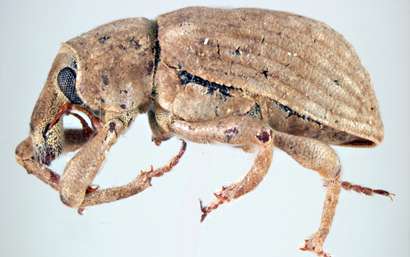Mississippi entomologists report on benefits of neonicotinoid seed treatments on rice

According to researchers from Mississippi State University, rice seeds that are pre-treated with neonicotinoid pesticides yield better than untreated crops and suffer less damage from rice water weevil, the most widely distributed and destructive early-season insect pest of rice in the United States. However, the economic benefits of investing in pre-treated seed depend on the level of insect pressure. The results of their study have been published in the Journal of Economic Entomology.
"There was no observed yield or economic benefit from the use of an insecticidal seed treatment in areas of low pressure," they wrote. However, "All seed treatments showed an economic advantage in areas of high weevil pressure."
Determining an "economic threshold"—the pest density at which management action should be taken to prevent an increasing pest population from reaching an economically damaging level—is one of the key concepts of Integrated Pest Management (IPM). This study seems to confirm the validity of economic thresholds. If insect pressure is low, then the cost of the neonic-treated seeds may not be worth paying for; if insect pressure is high, then the money saved by investing in the treated seeds will probably be well worth it.
"The problem with rice water weevil is that it does not infest the field until it is flooded, about 3-5 weeks after planting," said Dr. Jeff Gore, one of the co-authors. "Based on most of our research, we see an economic benefit of neonicotinoid seed treatments on 70-80 percent of the rice grown in the state annually. Unfortunately, we are not able to accurately predict which fields will have a significant infestation because of when infestations occur relative to when the crop is planted. As a result, we recommend a seed treatment on all of our rice in Mississippi."
More information: The full article, "Efficacy of Selected Insecticides Applied to Hybrid Rice Seed," is available at jee.oxfordjournals.org/lookup/ … i/10.1093/jee/tov310
Journal information: Journal of Economic Entomology
Provided by Entomological Society of America


















